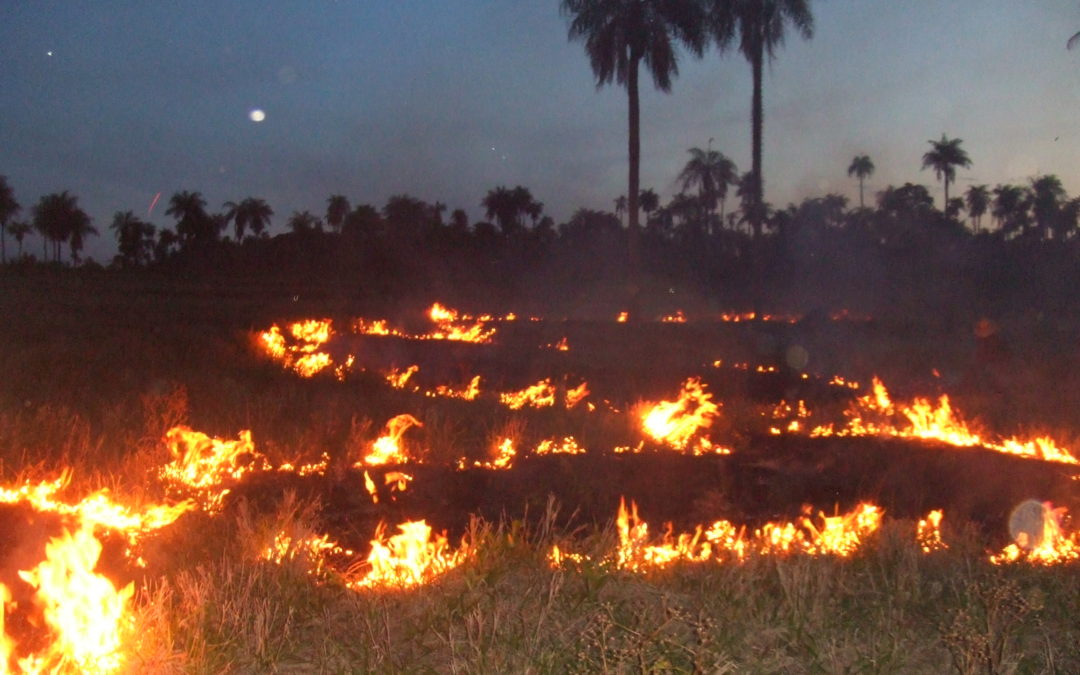The use of fire in a controlled fashion is an effective way of clearing ground for planting crops. The important word is controlled for without controls a fire will soon run wild.
The stubble left from the previous planting along with grass and weeds that have sprouted since the crop was harvested need to be cleared. They will eventually rot down but takes a long time. Reducing all that is unwanted to ash returns the nutrients to the soil far quicker.
Additionally here in Paraguay the climate encourages the rapid growth of grass. A field left abandoned for just a few months will soon start to turn green as grass recolonizes.
However whilst burning off unwanted ground cover is effective it is all too often done without any planning or forward thought. The result of which is that rather than simply clearing a field for planting a vast swathe of countryside is reduced to ash. Several times my land has been burnt off by uncontrolled fires lit elsewhere.
Laziness plays a part in turning a small fire into a large uncontrollable one. The surest way to ensure a fire does not escape is the cutting of fire breaks before it is lit. These are often though not cut as the farmer feels that would be too much work to spend on a fire he is sure he can control.
Another reason for a fire to run out of control is a failure to take the weather into account. A period of calm still air is obviously the ideal time to be starting a fire. This often occurs late in the day towards evening. Someone wanting to finish the days work before dark may well be tempted to light his fire earlier when there is a steady breeze blowing hoping the wind will stop before it becomes an issue.
Without checking the forecast or studying the clouds there is no way to be certain that the wind will stop blowing. Far more likely it will grow in strength for a while. It only takes a few extra strong gusts of wind to whip even the smallest fire up into something uncontrollable.
One final reason a fire may become uncontrollable is a lack of man power. However well one person may feel they can stop a fire from escaping it is undeniable several people working together would stand a far better chance. Also sadly there are those cases where one person lights a fire and then leaves it to burn while he does something else.
All these problems can though be avoided with a little planning. Fire treated with respect is a very useful tool.
I often set small fires to clear predetermined pieces of ground. These are never a problem. Nor should they be.
I have found that dead grass will lie for several years before rotting away. The only solution is burning. Left alone not only does it make the ground unusable but over time the layer of dead material becomes thicker. Hence when it is burnt the resulting fire is larger, fiercer and more dangerous.
It is not just in situ that the dead grass is burnt off. From under trees and near plants that would be damaged by the heat of a fire I clear the dead and unwanted material away. This I then collect to burn as a bonfire where the heat will cause no damage.
Gardening in this way I have a wide weed free ring around the house. This looks smarter than rough grass and weeds. Additionally it keeps unwanted snakes and insects away from the house as they do not like travelling across open ground.
Furthermore by doing that I receive protection against any fires that may be lit and have escaped elsewhere. It has been a few years since that last happened. When it did I was able to sit comfortably in the house knowing that at no time was the house or garden in any danger. This was even with fires raging all all four sides of the house.
I continue to set regular small fires and watch over them until they are burnt out. A controlled fire need harm or distress no one.


How about keeping a barren border around the entire land to prevent someone’s fire from spreading onto yours? I wonder how wide it would have to be. Suppose it’s not practical to maintain.
BTW, looks like comments are turned off on your Concepcion post. I was wondering where one could catch the boat from Asuncion. Would be a fun ride.
A clear border would need to be a good metre wide. Things though grow back so quickly it would be more trouble than it’s worth to maintain. Dozens of metres round the house rather than hundreds round the border is a more sensible amount of work.
I’ll have a look at the Concepción post and it’s comments. I did do a boat from there to Asunción years back. Think it still runs as it was more cargo than passengers. Takes all day, but worth it. Will be writing about the trip when I find the right photos